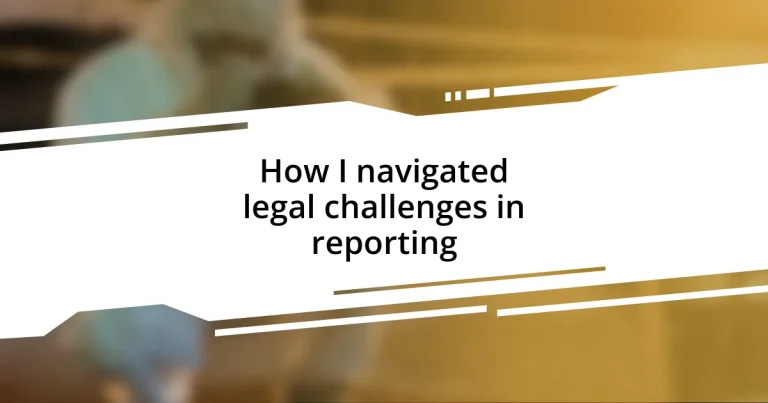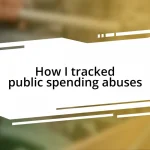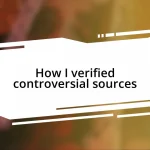Key takeaways:
- Understanding key legal principles, such as the Freedom of Information Act and the actual malice standard, empowers journalists and ensures accountability in reporting.
- Building relationships with legal experts provides valuable insights and support, enhancing journalists’ ability to navigate complex legal challenges effectively.
- Accurate documentation of sources is crucial for credibility and can prevent misrepresentations, reinforcing the importance of thorough research.
- Awareness of press freedom rights is essential for reporters, enabling them to assert their access to information and navigate potential obstructions from authorities.
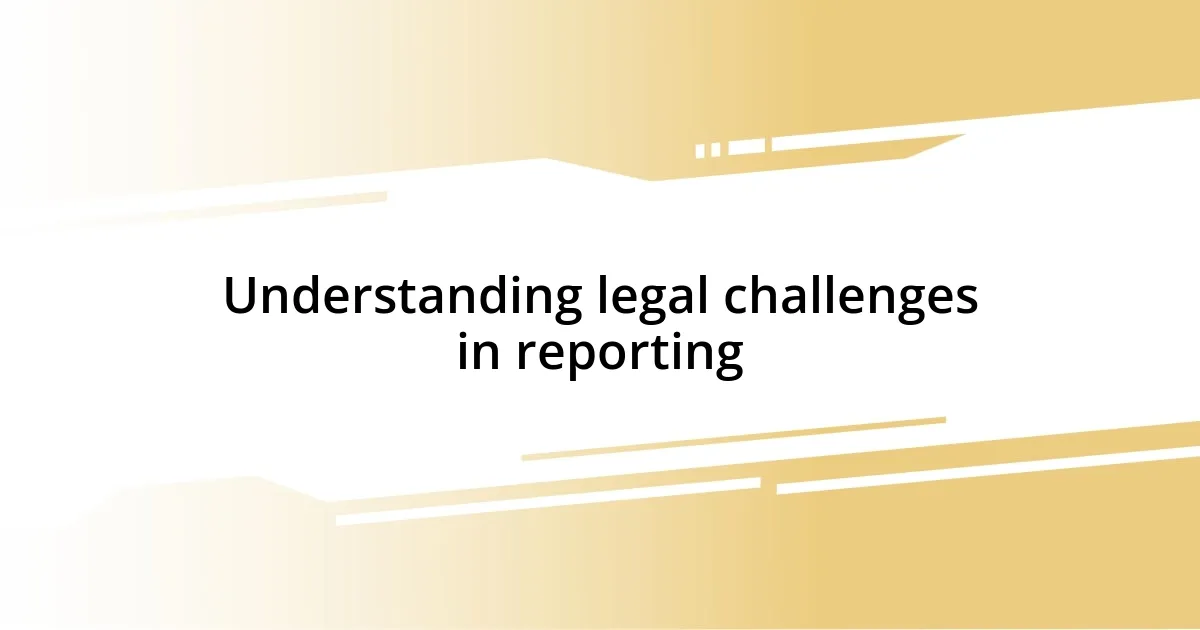
Understanding legal challenges in reporting
Navigating the legal landscape in reporting can feel like walking a tightrope, where one misstep can lead to significant repercussions. I remember a time when I was covering a sensitive story, and I had to constantly ask myself—am I protected by the First Amendment? That uncertainty was unsettling, yet it pushed me to dig deeper into the nuances of journalistic freedom.
One of the greatest challenges I faced was understanding the differences between defamation and opinion. I’ve seen talented reporters get caught in this gray area, landing them in hot water for comments that were more subjective than factual. Reflecting on my own experience, I learned the importance of clarity in language—every word we choose can have legal implications. How can we effectively report the truth without risking our integrity?
There are also unexpected legal ramifications in situations I hadn’t anticipated, like when covering public figures. I once wrote a piece that seemed harmless but attracted a slew of legal threats. This taught me that sometimes, the most innocent headlines can stir up the most contested waters. It’s crucial, then, to stay informed about not just the laws, but also the cultural attitudes surrounding them. What’s your experience with legal issues in reporting? The more we share, the better equipped we are to navigate this complex terrain.
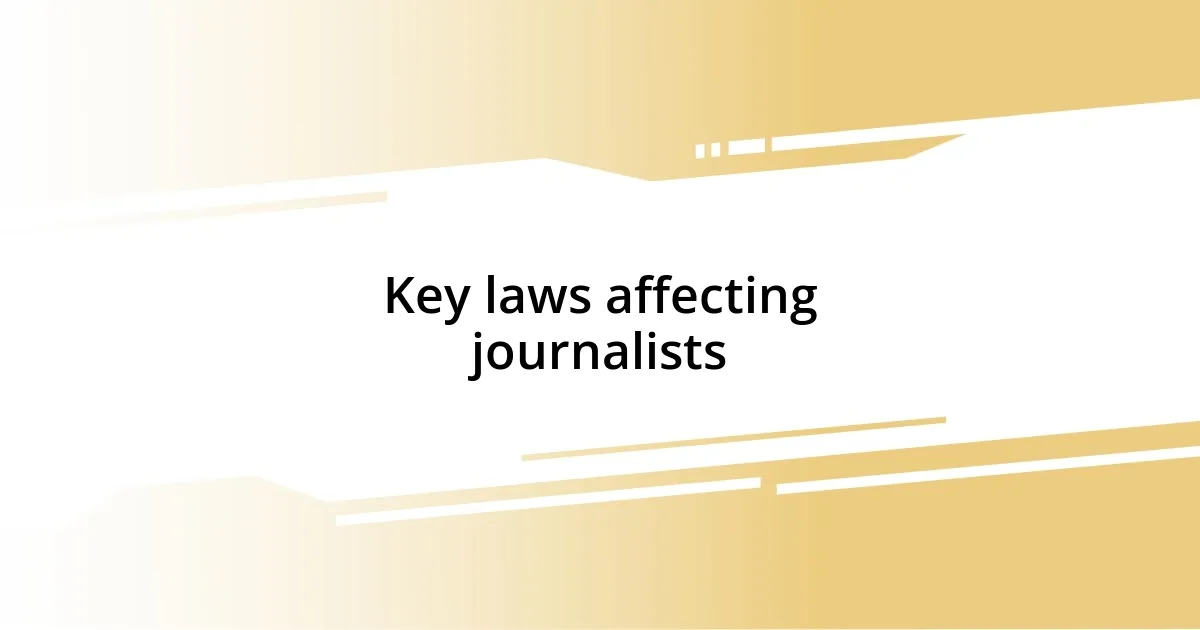
Key laws affecting journalists
Key laws affecting journalists encompass various aspects of our profession that can have profound implications on how we report. For example, the Freedom of Information Act (FOIA) was a lifeline during my investigative reporting days. I remember spending countless hours drafting requests, the thrill of anticipation coursing through me as I awaited crucial documents. This law empowers journalists to access federal records—an essential tool for uncovering truths that those in power might prefer to remain hidden.
Another significant law that every reporter should grasp is the actual malice standard established in New York Times Co. v. Sullivan. This case clarified the burden of proof for public officials and, while initially intimidating, it reassured me that as long as I acted in good faith and without reckless disregard for the truth, I would have greater leeway in holding powerful figures accountable. Understanding this intricacy helped me feel more confident when crafting pieces about public officials, knowing that my commitment to truth-telling was legally safeguarded.
The landscape of privacy laws also profoundly impacts reporting, requiring a delicate balance between the public’s right to know and individual privacy rights. I’ve had moments where I had to weigh the moral implications of revealing certain information. There was a particular instance when I chose not to disclose a source’s identity, even though it could have bolstered the story. By navigating these legal challenges and making conscious choices, we not only protect ourselves but also maintain our journalistic integrity.
| Law | Description |
|---|---|
| Freedom of Information Act (FOIA) | Allows journalists to request access to federal agency records for transparency and accountability. |
| New York Times Co. v. Sullivan | Sets the actual malice standard for public officials in defamation cases, protecting journalists who report in good faith. |
| Privacy Laws | Regulate the balance between the public’s right to know and an individual’s right to privacy in reporting. |
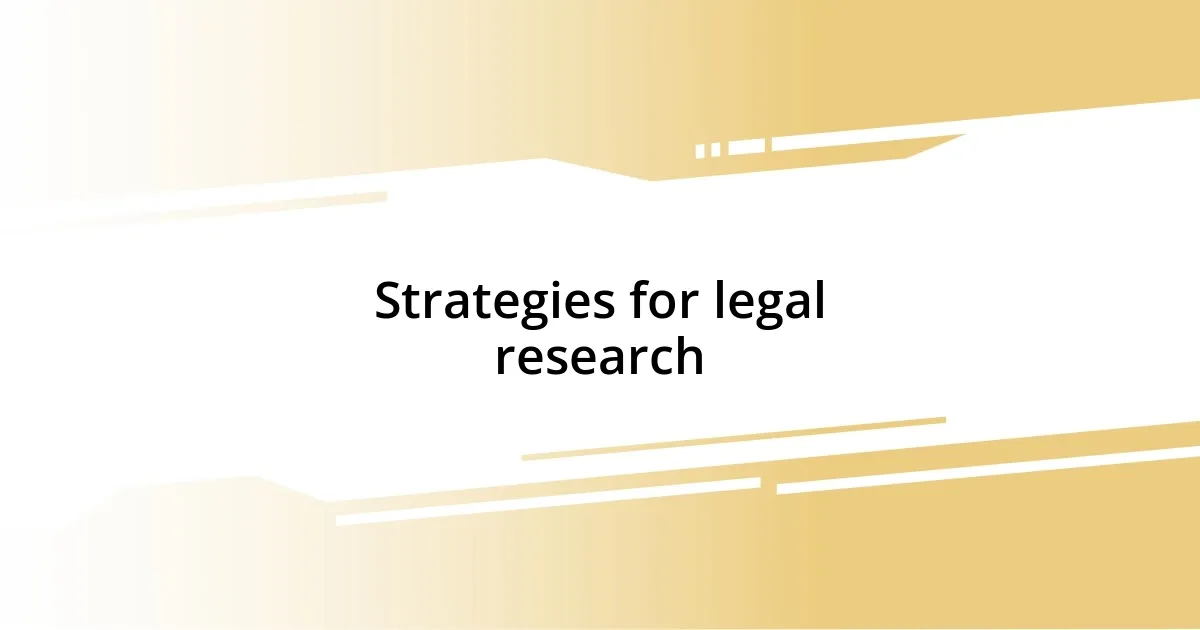
Strategies for legal research
When diving into legal research, I found that having a systematic approach is crucial. I often started by identifying the specific legal issues related to my work. This helps to focus my search on relevant statutes, case law, and regulations that directly impact my reporting. One particularly challenging investigation had me combing through online legal databases late into the night. The sense of accomplishment when I finally unearthed a landmark case that bolstered my argument was exhilarating.
Here are some effective strategies I’ve discovered for conducting thorough legal research:
- Utilize legal databases: Platforms like Westlaw and LexisNexis are invaluable for accessing case law and legal documents.
- Consult with legal experts: Building relationships with lawyers can provide you with insights that are often not found in public resources.
- Leverage public records: Familiarize yourself with local and state statutes that govern public records access in your area.
- Stay updated: Legal precedents and media laws evolve continuously; subscribing to relevant legal newsletters keeps you informed.
Moreover, every question I asked during my research opened up new opportunities for learning. I remember feeling overwhelmed during one reporting project when I had to disentangle a web of complex regulations surrounding libel laws. Yet, with perseverance and a spirit of inquiry, which I believe is essential for every journalist, I transformed that stress into a deep understanding of the legal protections available to me. Balancing the fear of potential legal pitfalls with the pursuit of truth became a profound part of my journey.
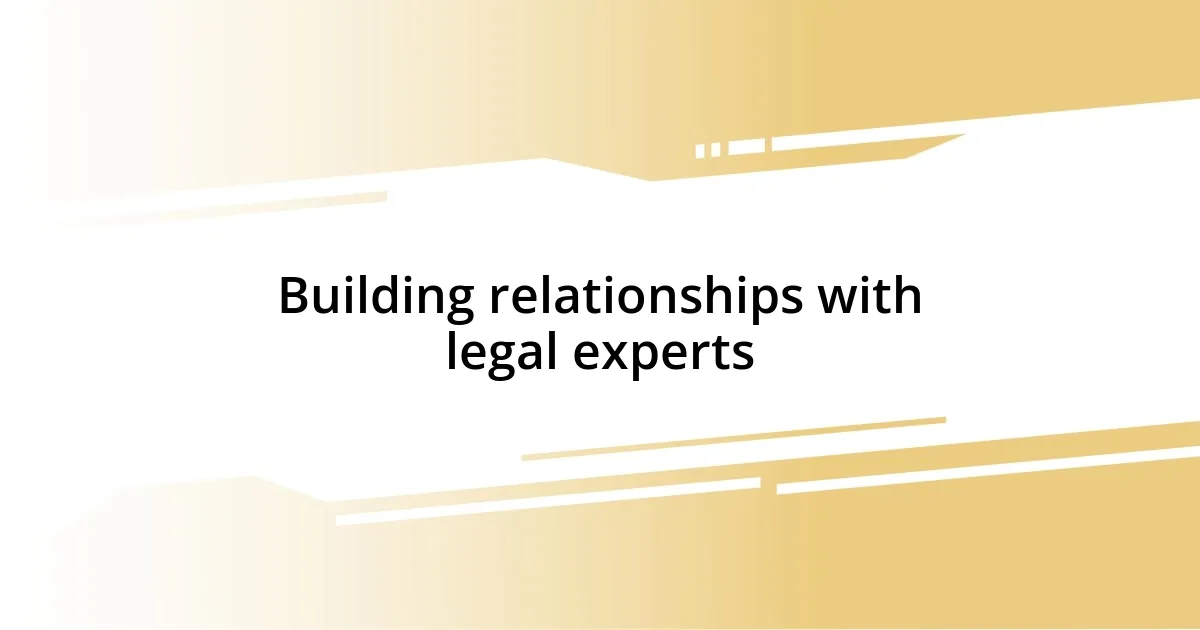
Building relationships with legal experts
Building meaningful connections with legal experts has been a game-changer in my reporting journey. When I first started, I felt like I was navigating a maze without a map. It was during one of those pivotal moments that I reached out to a local attorney specializing in media law. To my surprise, they took the time to explain the nuances of the Fair Use doctrine, which opened my eyes to new reporting avenues I never considered before. Those early interactions taught me how powerful it is to collaborate; it’s less about having all the answers and more about knowing whom to ask.
As I continued to build my network, I found that legal experts were often more accessible than I imagined. I remember attending a journalism conference where I casually approached a panelist during a break. What started as a simple chat evolved into an ongoing mentorship. This relationship not only enriched my understanding of legal principles but also built a safety net for my reporting endeavors. Have you ever found yourself stuck on a legal quandary while crafting a story? It’s in those moments that a friendly legal expert can offer guidance, turning anxiety into clarity.
Moreover, engaging with legal professionals often reveals insights beyond the textbooks. Sometimes, they share their experiences navigating the legal system, shedding light on real-world applications of complex laws. I recall a conversation with a media lawyer about a high-profile defamation case they worked on. Their recounting of the intense legal battles made me realize that behind every legal term is a human story—a reporter’s professional integrity could hang in the balance. Building these relationships isn’t just about knowing the law; it’s about understanding the human context that shapes our work as journalists.
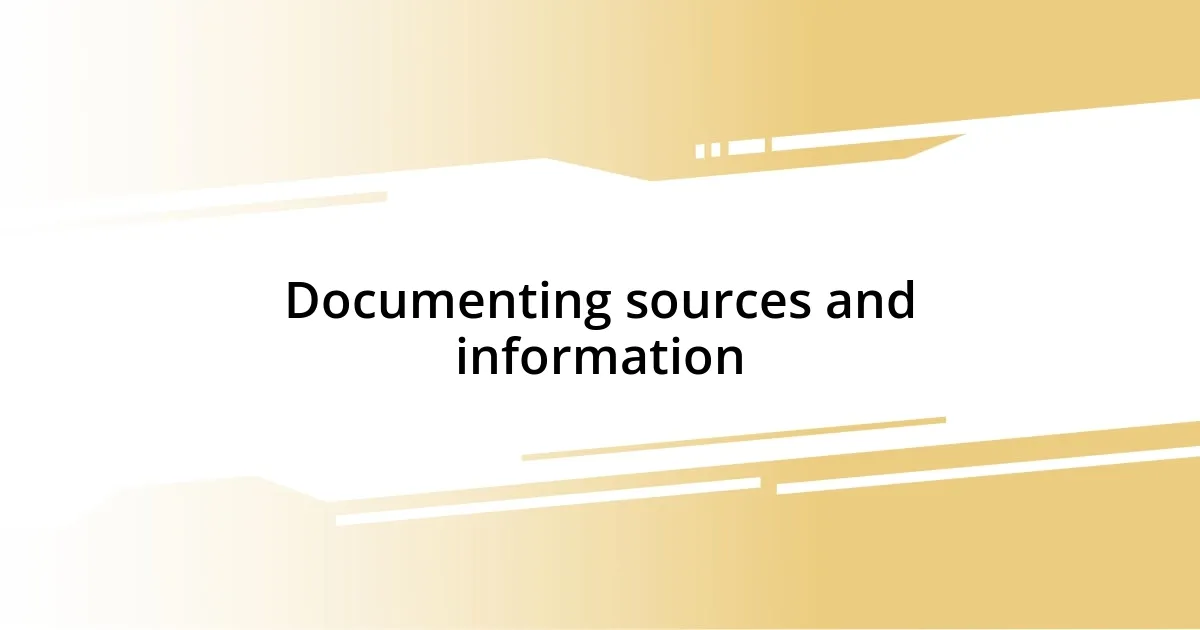
Documenting sources and information
Documenting sources accurately is not just a best practice; it’s an essential part of my reporting process that builds my credibility. I’ve learned that a simple yet effective method is to maintain detailed notes on where I obtained my information, whether it’s a quote from an interview, a statistic from a report, or a legal precedent I came across during my research. I recall a time when I had to chase down a source after publishing a piece. Because I had meticulously documented everything, I easily reconnected with my informant and clarified a misrepresentation. That experience underscored how thorough documentation can save a journalist’s reputation.
Moreover, I always make sure to gather supporting documents whenever possible. For instance, when covering a controversial zoning law, I requested public records relating to the decision-making process. These documents not only fortified my claims but also revealed some surprising facts that enriched my story. Isn’t it fascinating how a well-documented source can add layers and depth to a report? It certainly felt exhilarating when my findings not only informed my audience but also sparked discussions within my community.
I also value the practice of cross-referencing. When I encounter conflicting accounts or narratives, taking the time to verify my information through multiple sources ensures that I present a balanced perspective. I remember a particularly contentious report where different stakeholders gave completely opposite views on a local issue. In untangling their stories, I found not just the objective facts but also the emotional undercurrents that shaped their opinions. This dual focus not only deepened my understanding but also allowed me to write a more nuanced and compelling piece. Have you had moments where the layers of a story unfolds right before you? Those moments, fueled by solid documentation, can truly transform your reporting.
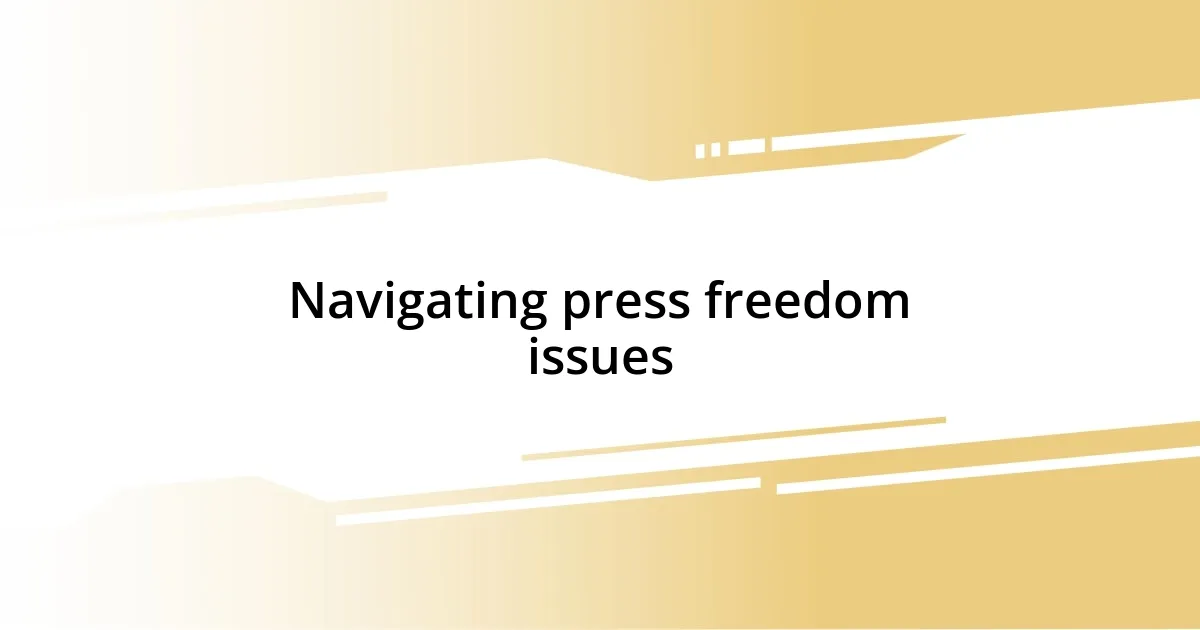
Navigating press freedom issues
Navigating press freedom issues often feels like walking a tightrope. I vividly remember a situation where I was reporting on a local protest against government policies. As I covered the event, there was palpable tension in the air, and I faced a dilemma when police began to obstruct journalists’ access. I felt a surge of panic; how could I report accurately if I couldn’t see what was happening? In that moment, I realized the importance of staying informed about my rights as a reporter. Understanding press freedom laws not only bolstered my confidence but also empowered me to assert my position respectfully.
I’ve often found that press freedom challenges can arise in unexpected places. For example, while working on a feature about community policing, a local official tried to limit my access to critical documents, claiming they were off-limits due to “security reasons.” This felt disheartening, but instead of backing down, I remembered a legal counselor’s advice: always ask for written justification. So, I went back armed with that knowledge and made a formal request for the records. That experience taught me that being proactive and knowing the legal framework around press freedom could change the trajectory of my reporting.
Sometimes, the emotional weight of these issues can be overwhelming. I recall an interview with a journalist who faced severe repercussions for exposing corruption within a prominent organization. Listening to their story, I felt a mixture of admiration and dread. What drove them to take such risks? It was their unwavering commitment to truth and accountability. Their courage resonated deeply with me, reminding me that navigating press freedom isn’t just about personal legal challenges; it’s a shared journey for journalists everywhere, fighting for the right to inform the public. Can you feel the weight of that responsibility? I surely do every time I sit down to write.












